Meet some of our past economics majors.

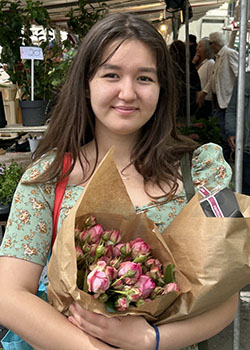
Hometown: Bishkek, Kyrgyzstan
Major: economics minor: philosophy
What was your motivation to major in economics?
My motivation for majoring in economics came from seeing how practical and impactful the field can be in addressing real-world issues. In high school, I volunteered at a nonprofit focused on helping formerly incarcerated individuals reintegrate into society and felt frustrated by my limited ability to make a difference. It was through studying economics and data analysis that I realized I could contribute to larger, systemic conversations that drive meaningful change.
Have you taken part in any economics research opportunities at Oxy or elsewhere?
I had the opportunity to be a research assistant in my first year under Professors Lopez and Harris, where I explored the role of education in reducing recidivism. That summer, I became an independent researcher through the Summer Research Program, working with Prof. Mora on trade interdependence. In my sophomore summer, I continued research at the International Fund for Agricultural Development, conducting impact assessments on developing projects and creating an asset index.
It was through studying economics and data analysis that I realized I could contribute to larger, systemic conversations that drive meaningful change.
Do you have any advice for a student considering a major in economics?
My advice would be that while economics may seem intimidating at first, once you grasp the fundamentals, it opens up many exciting opportunities. I encourage students to discover their specific interests within the field and continue learning both in and out of the classroom—whether through professors, research, or job experiences.

Hometown: Bellaire, OH
Major: economics, minor: politics
What do you like most about studying economics?
I've always lived by the adage that we must choose to see the world for what it could be. To me, the study of economics feels exceptionally pragmatic when it comes to addressing so many issues faced by the people of the wider world. I love that I get to study, analyze, and look for solutions to matters critical to building a better world, such as socioeconomic inequality and sustainable development. I truly feel that a firm understanding of economics is paramount in the pursuit of a bright future!
Can you describe your working relationships with econ professors? Were there any standout classes you’ve taken?
Ever since my first year of college, I've found myself at home within the Economics Department. In every course I have taken, my professors have been so infinitely willing to offer help and words of encouragement both inside and outside of the classroom. Moreover, my professors have served as incredible mentors, offering guidance on my career trajectory, listening to my wider struggles, and seeking to help me devise a course of action every time. Though college has not been easy as a first-generation student, I've truly never felt alone thanks to my incredible professors. As for a standout class, it truly is impossible to pick just one, but if I were to, it would have to be Economic Data Analysis. Professor Ngo is an exceptional, welcoming professor, and the course is designed to build a toolkit that is truly invaluable.
I love that I get to study, analyze, and look for solutions to matters critical to building a better world, such as socioeconomic inequality and sustainable development. I truly feel that a firm understanding of economics is paramount in the pursuit of a bright future!
What are your plans or ambitions post-Oxy and how has the liberal arts approach helped to shape those ambitions?
After my time at Oxy, I plan to spend a few years working in industry before returning to my education to pursue a graduate degree. I am forever committed to furthering my knowledge! I don't have a perfect vision for my path forward, but I know that the curriculum at Oxy has offered me a wide array of skills that will keep me prepared for wherever life may take me.
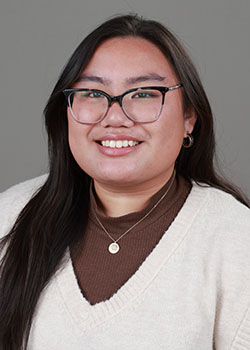
Hometown: West Covina, CA
Majors: economics, Comparative Studies in Literature and Culture
Can you describe your working relationships with econ professors? Were there any standout classes you’ve taken?
On top of teaching their engaging classes, professors in the economics department are devoted to fostering community with their students. As I grew more comfortable with going to office hours over the years, I started to take more initiative in reaching out to my professors for guidance on my career and my interests beyond the classroom. These interactions, which became the highlight of my experience as an economics major, helped me build a strong support system among the economics faculty. I felt comfortable enough to explore my interests in economics authentically, and to learn more about what drives me to study econ—especially as someone who is not going into a traditional economics career.
One of the most memorable classes I have taken in the economics major was Industrial Organization with Prof. Lesley Chiou. I really enjoyed it because we focused on real-life applications of economic theory by doing case studies about our topics from class. We also had the opportunity to act out firm competition with our peers in a competitive strategy game where students were grouped into “firms” and competed with one another—and various alumni teams—across four markets to see who could make the most profit. It was really fun to do so many hands-on applications of economics and we were able to engage with the material in ways that also helped to build community among our classmates.
Our professors always tell us that, at its core, economics is the study of decision-making. This view of economics allows you to apply the concepts you learn in the major to any field or career.
What are your plans or ambitions post-Oxy and how has the liberal arts approach helped to shape those ambitions?
Post-graduation, I plan to pursue a career in digital marketing and brand development, which is not considered a traditional economics field, but it perfectly embodies a blend of my personal and creative interests with my academic experience. I also plan to go back to school for an MBA after spending some time developing my career. Oxy’s liberal arts education helped expose me to different topics outside of my major, allowing me to explore the ways that I could blend my creative side with my passion for economics. Most notably, I developed a love for Media Arts and Culture (MAC) classes and became interested in digital design and marketing. These experiences, along with the connections that I’ve made with faculty outside my major, have helped me to forge my own unique path using my formal education as an economics major in combination with the skills I’ve learned through marketing and media internship experiences.
Do you have any advice for a student considering a major in economics?
Our professors always tell us that, at its core, economics is the study of decision-making. This view of economics allows you to apply the concepts you learn in the major to any field or career. Not only do you learn to think critically, but you gain a whole community of support from your peers and the faculty. I also highly recommend getting involved in the economics student clubs such as the Economics Student Association (ESA) and Women of Economics (WOE). Both of these organizations exist as ways to build relationships with your peers and provide opportunities for professional growth! Also, don’t be afraid to ask your professors out for coffee at the Green Bean if you want to learn more about their research or their professional journey!
Hometown: San Jose, CA
Major: economics
Have you taken part in any economics research opportunities at Oxy or elsewhere?
I worked with Professor Andrew Jalil on a macroeconomic study on asset price bubbles. I was able to further explore a topic that is not fully understood yet. The narrative research approach is fascinating and it was a wonderful experience!
What do you like most about studying economics?
My favorite part of economics is the mathematical models, their interpretations, and limitations. Economics can be applied to nearly any social phenomena and underscores real change.
After graduation, I am pursuing a masters degree in economics. I am interested in many different fields of econ, but ultimately want a career where I am positively contributing to society.
Do you have any advice for a student considering a major in economics?
I recommend attending office hours to either ask questions about coursework or just chat with the professors. They want to help and see you succeed. Ask for help where you need it! You’ll always gain something new from asking a question.
What are your plans or ambitions post-Oxy and how has the liberal arts approach helped to shape those ambitions?
After graduation, I am pursuing a masters degree in economics. I am interested in many different fields of econ, but ultimately want a career where I am positively contributing to society. I am exploring options in think tanks, the commercial sector, and the public sector. Being at a liberal arts college has furthered my passion for social justice.

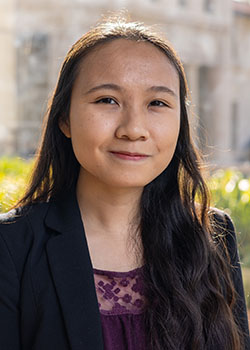
Hometown: San Gabriel, CA
Major: economics Minor: public health
Have you taken part in any economics research opportunities at Oxy?
I am incredibly grateful to have been able to participate in multiple economics research opportunities at Oxy. In my junior year, I was a research assistant for Professor Diana Ngo and worked on two projects: one focusing on the STEM gender gap and another that uses consumption data to better target interventions that alleviate poverty. I also began working as a research assistant for Professor Kevin Williams on a project relating to higher education. The data cleaning and literature review skills I developed from these research assistantships were extremely helpful, and it was amazing to be able to work on research with real-world policy implications.
I also had the opportunity to do independent research. The summer after my junior year, I participated in the Undergraduate Research Center’s summer research program with Professor Williams as my mentor. My project focused on the impact of policies that increase administrative burdens (i.e., things like increased paperwork that make it harder for individuals to apply) on child Medicaid enrollment rates. For ECON 498 (Research Seminar) with Professor Jorgen Harris, I am currently looking at the impact of hospital closures on inpatient mortality at adjacent hospitals. Research can be challenging, but it is extremely rewarding to be able to apply economic concepts to a wide range of real-world questions.
Research can be challenging, but it is extremely rewarding to be able to apply economic concepts to a wide range of real-world questions.
Can you describe your working relationships with econ professors? Are there any standout classes you’ve taken?
The professors in the Economics department are amazing and extremely supportive of students! In addition to being passionate about their field and research, professors genuinely care about teaching and mentoring students. In every class I have taken, professors have held regular office hours and are open to talking about coursework, future career paths, or random updates in the world of economics. Even professors with whom I never took a class or who I took a class with semesters ago still say “hi” and ask me about the economics major and life. In terms of stand-out classes, Economics Data Analysis and Applied Econometrics were two of the most influential courses in my time at Oxy. Both classes opened my eyes to how economic theory and economic research techniques could be applied to a wide variety of topics, be it public health, education, development, sports, or the music industry.
Do you have any advice for a student considering a major in economics?
Don’t let previous failures or perceived shortcomings stop you from pursuing the economics major or from pursuing opportunities you want! There are elements of economics courses like math and Stata programming that can be challenging, especially if you are like me and have never considered yourself good at math or coding. However, there are many support systems within the economics department. Professors regularly hold many office hours, and there are also peer tutors/TAs who hold study hours as well. Women of Economics (WOE) and the Economics Student Association (ESA) often have events and meetings where you can meet other economics majors who can provide guidance on economics-related topics. Furthermore, the economics department truly values growth over time. Getting a less-than-ideal grade in one exam or class does not mean you cannot succeed later in 300-level economics coursework or research.
My time at Oxy also highlighted the importance of using qualitative research from other disciplines to inform quantitative research so as to ensure health equity.
What are your plans or ambitions post-Oxy? How has the liberal arts approach helped to shape those future ambitions?
After graduation, I plan to work as a research assistant for 2-3 years before pursuing graduate studies in health services research or health policy. The liberal arts approach at Oxy helped shape this path by allowing me to study health-related issues through an interdisciplinary lens. My time at Oxy also highlighted the importance of using qualitative research from other disciplines to inform quantitative research so as to ensure health equity. These experiences have been extremely helpful in preparing me for health research, as it will inevitably require interdisciplinary problem-solving and collaboration with professionals across disciplines.
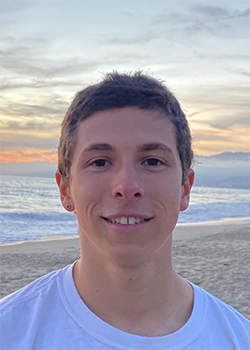
Hometown: Portland, OR
Major: economics
What was your motivation to major in economics?
When I entered Occidental, I did not have a clear idea of my career goals or what I wanted to major in. I cast the net wide, taking a variety of courses across many departments. Economics stood out as a perfect blend of my interests in problem-solving and strategy, and a field of study relevant to a wide array of career paths. I’ve found studying economics intellectually stimulating and engaging. I’ve developed my qualitative and quantitative skills through learning theory, using math, and working with data. No matter your academic interests, I’d recommend an introductory economics course to learn how and why businesses and economies operate the way they do.
Economics stood out as a perfect blend of my interests in problem-solving and strategy, and a field of study relevant to a wide array of career paths.
Can you describe your working relationships with econ professors? Are there any standout classes you’ve taken?
The economics department is full of enthusiastic and engaging professors who are eager to see their students grow and succeed. Office hours are a fantastic opportunity to get career advice, learn about potential research opportunities, and simply get help on assignments or studying. Of the courses currently offered, my favorites have been Industrial Organization, Macroeconomic Policy and Financial Markets, Game Theory and Econometrics, in no particular order. While these are challenging courses, they are exciting (no joke) and relevant to the real world.
What are your plans or ambitions post-Oxy? How has the liberal arts approach helped to shape those future ambitions?
I’m eager to pursue work in a strategy or finance-related position, where I can directly apply my education and background while continuing to learn, grow and develop my skill set. My coursework has given me a solid foundation in economic theory, quantitative and analytical skills, and strategy formulation. A liberal arts education provides exposure to a wide range of subjects; it has developed my capacity to think critically, communicate and collaborate across disciplines, and approach complex tasks with creativity.
A liberal arts education provides exposure to a wide range of subjects; it has developed my capacity to think critically, communicate and collaborate across disciplines, and approach complex tasks with creativity.
Do you have any advice for a student considering a major in economics?
For those considering majoring in economics, here are a few pieces of advice:
- Explore different areas: economics is a broad field with a variety of specializations, including macroeconomics, microeconomics, econometrics and international economics. Take courses in all these specializations. Take courses in other departments, as well; the liberal arts education brings with it the opportunity to gain a broad perspective of the world through various disciplines.
- Stay informed: The Occidental education is about applying the skills and knowledge you gain in the classroom to the real world. Economics is deeply connected to current events. Staying up to date on economic news, policies and trends is a practical application of economic theory, and instills the subjects learned in class.
- Networking matters: Occidental is a small school with a tight-knit community. It doesn’t take much effort to connect with professors, alumni and fellow students. The economics department (among others) has many successful graduates who have interesting perspectives on career, education and life. Networking can build relationships with a great group of people, lead to research and career opportunities, and be an enriching part of the Oxy experience.
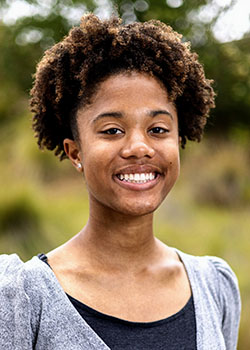
Hometown:Los Angeles, CA
Major: economics Minor: cognitive science
What was your motivation to major in economics?
I came to Occidental undeclared, but in the back of my mind, I knew economics was the right choice for me. I am passionate about the inequality that exists in society, as well as urban economics issues such as homelessness and the shortage of affordable housing. Majoring in economics allowed me to learn more about these issues and how we can use the field of economics to better understand them and construct potential solutions. I had an “aha” moment during my junior year after taking the Urban Economics and Economics of Race and Gender courses. Everything snapped into place and my choice to major in this subject made sense.
We had the chance to use an intersectional lens to investigate how we can reform our economy to address discrimination and inequality.
Can you describe your working relationships with econ professors? Were there any standout classes you’ve taken?
The professors have all been very supportive and encouraging. They are always looking to help you both in school and with your aspirations beyond school. One of my favorite 300-level courses in the major was Economics of Race and Gender with Professor Mary Lopez. It showed me how we can use economics theory and models to address so many issues. We had the chance to use an intersectional lens to investigate how we can reform our economy to address discrimination and inequality. I also enjoyed Urban Economics. After taking that class I became very interested in public policy.
What do you like most about studying economics?
Economics is everywhere. It gives us the ability to understand the world and its problems in a very fascinating way. I like that economics is entangled with so many other subjects. More often than not what I learned in my economics classes was also talked about in the classes that I took in other departments. I enjoy observing the crossovers between economics and these other areas. I feel like majoring in economics gives me a different perspective on how the world functions.
Economics is such a broad field. Economists are in the sports industry, the music industry, television and film, etc. There are so many possibilities.
Do you have any advice for a student considering a major in economics?
My advice would be to get involved with the economics department. Go to office hours and engage with your peers. Going to TA sessions or office hours may feel like an inconvenience, but you will build meaningful connections and learn so much. I would also say you should take all of your math classes as soon as possible. Building a good foundation there will make your life easier as you continue your journey in the department. My last bit of advice would be to think about the industries you love and think about what economics looks like in those fields. Do not be afraid to take classes in other departments to explore your other interests as well. You’ll find that they align with your economics interests. Economics is such a broad field. Economists are in the sports industry, the music industry, television and film, etc. There are so many possibilities.
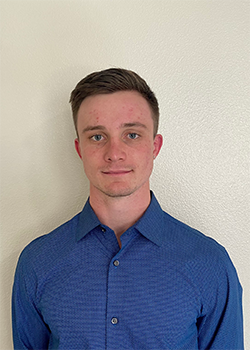
Hometown: Berkeley, CA
Major: economics; minor: politics
What was your motivation to major in economics?
I wanted to major in economics because it offers a variety of tools for answering questions I’m interested in. I’m really interested in politics and policy, and economics offers a great theoretical framework to understand these policies and a wide variety of empirical methods to evaluate them. I took my first economics class in the fall of 2020 and the professor often highlighted how the models we were learning could be used to understand the economic shocks caused by Covid-19. Seeing the direct applicability of the material immediately drew me to the major.
I’m really interested in politics and policy, and economics offers a great theoretical framework to understand these policies and a wide variety of empirical methods to evaluate them.
Can you describe your working relationships with econ professors? Are there any standout classes you’ve taken?
All of my professors have been incredibly open and excited to work with students both during and outside of class. Not only are they happy to answer any questions related to class material, but are also always willing to engage in conversations about current events or answer career and internship questions. I always have a hard time deciding what my favorite classes in the department are because they seem to change every time I take a new class. I have really enjoyed both senior seminar classes because of the opportunity they offer to apply so much of what I’ve learned in the major to specific topic areas.
What are your plans or ambitions post-Oxy? How has the liberal arts approach helped to shape those future ambitions?
I plan to work as a research assistant for a couple years to develop my technical skills and get experience outside of the classroom. Afterwards, I want to pursue a Ph.D. in economics. The liberal arts approach has allowed me to have a really diverse educational experience ranging from an Asian American literature course to a biology lab. These experiences taught me how to look at problems multiple ways and have a variety of strategies for coming up with solutions. This is really helpful for thinking about and working on research projects. Beyond that, having so much control over what classes I took really allowed me to love learning.
Having so much control over what classes I took really allowed me to love learning.
Do you have any advice for a student considering a major in economics?
Do it! Economics is a really useful major and the skills you learn are applicable across a wide variety of careers. Also, make use of office hours! Some of my best conversations and most productive learning have taken place during office hours and all of the faculty are very open and helpful. Not only will they help you do well in their classes, but you will also learn a lot beyond the material.
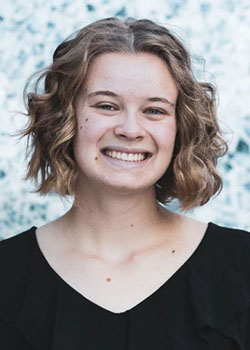
Hometown: Apple Valley, CA
Major: economics; minor: mathematics
Can you describe your working relationships with econ professors? Are there any standout classes you’ve taken?
The economics faculty are all incredibly supportive of students. Any time I have a question about class material, career pathways, or even just something I heard about in the news, my professors are eager to sit down with me and discuss it. As far as classes go, I particularly enjoyed my “Intermediate Microeconomics” class. We learned so many ways to think mathematically about peoples’ lives and choices. Concepts from “Intermediate Micro” pop up every day, either in my other economics classes or in my daily life.
Have you taken part in any economics research opportunities at Oxy or elsewhere?
Last summer I conducted independent research in economics through the Undergraduate Research Center (URC). I worked with my mentor to design a project examining whether the gender wage gap shapes the uneven allocation of household chores. It was rewarding to take theories and technical skills that I’d developed in the classroom and apply them to answering a question about the real world.
Last summer I conducted independent research in economics through the Undergraduate Research Center (URC). It was rewarding to take theories and technical skills that I’d developed in the classroom and apply them to answering a question about the real world.
What do you like most about studying economics?
I like that economics is a hard approach to soft issues. What I mean by that is economists conduct rigorous empirical research on topics that are sometimes difficult to quantify, like the family or discrimination, in order to draw useful conclusions that help us to better understand the world. Economic research is at once challenging and an opportunity to be creative. My own unique experience is an asset in the field, since the things I notice as I move through my life lead me to want to explore new and interesting questions.
What are your plans or ambitions post-Oxy? How has the liberal arts approach helped to shape those future ambitions?
After Oxy, I plan to work as a research assistant for a couple of years, learning skills and building experience before I return to academia to undertake a Ph.D. I am grateful for my liberal arts experience because it has rounded the way I look at the world. I am able to flexibly build connections between topics, as well as think critically about the stories that economists draw out from their research.
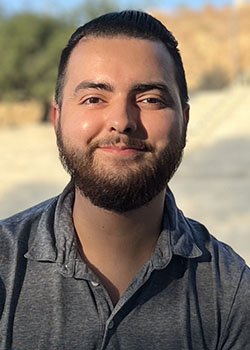
Hometown: Los Angeles, CA
Majors: economics, history
What was your motivation to major in economics?
My motivation to major in economics really came through my exposure to the field in my first-year seminar taught by Professors Lopez and Wandschneider. I had little to no knowledge of economics prior to this and was intrigued by the class description that mentioned how economics could address social issues around race, gender, immigration, and more. After taking this course, I realized how powerful economics could be in advocating for social change and justice. I also left the class with immense curiosity about the math and theory used in economics. I knew I would have to take more economics classes to satisfy this curiosity. I decided to major in economics after realizing how my first major, history, could intertwine with my interests in economics. I realized this in my intermediate macroeconomic theory course, which exposed me to macroeconomic research papers that tackled big questions of history such as, why do some societies prosper more than others? How can we promote economic growth at home and abroad? And how can we reduce the suffering caused by economic downturns? Understanding these and similar questions continues to drive me to study economics.
After taking [this first-year seminar], I realized how powerful economics could be in advocating for social change and justice.
Can you describe your working relationships with econ professors? Were there any standout classes you’ve taken?
The relationships I have fostered with econ professors has been a large part of my success at Occidental. It was clear early on in my Oxy career that econ professors were passionate about their field and the implications of their work. Oxy econ professors were always open to meeting with me and discussing their work regardless of whether I had taken their courses. This was often the guidance I used to choose courses such as enrolling in Professor Mora’s international economics course or Professor Jalil’s macroeconomic policy senior seminar. Meeting with econ professors has also led to great mentor relationships, such as my work as a research assistant studying the Port of Los Angeles with Professor Mora or Professor Harris’ informal mentorship in my history research projects. Even professors I have not taken classes with such as Professor Ngo have created an incredibly welcoming and supportive environment for my personal, professional, and academic growth in economics and beyond.
What do you like most about studying economics?
The aspect of studying economics I enjoy most is the diversity in subfields and interests across the major. In addition to my interests in international economics, macroeconomics, and econometrics, I feel equipped to study and discuss other areas of economics. Having conversations with students and professors interested in other subfields such as industrial organization or even finance is incredibly stimulating mentally. This intellectual curiosity is supported by the encouragement of econ professors to apply the skills and knowledge developed in the econ major across the field and across other fields. I have especially enjoyed applying my knowledge of econ to my research studying development in history.
I only really understood the importance of being comfortable in discomfort during my third year at Oxy. Talking to professors was key in building my comfort and understanding why I wanted to pursue econ.
What are your plans or ambitions post-Oxy?
Post-Oxy, I plan to pursue a career in international development and/or international trade. I plan to explore both the private and public sector aspects of these fields. I ultimately hope to apply my skills and knowledge developed at Oxy to help others achieve the same (and hopefully better) resources and comforts that I enjoy in my life. The liberal arts education I received at Oxy has been vital to me realizing the potential I have in my career aspirations. In addition to my majors in economics and history, I have taken courses in international relations, had the ability to conduct original research, worked with various professors, and been exposed to a broad spectrum of intellectual thought through friends, colleagues, and professors in other fields. This has made me confident in my ability to succeed in any career path I choose post-Oxy.
Do you have any advice for a student considering a major in economics?
My biggest advice for anyone considering a major in economics is to not be intimidated by what they do not yet know or let themselves get held back by failure. I was very anxious to take upper division econ courses because of my lack of comfort with math. Despite this, I saw econ as a challenge. I saw math as a tool for me to gain a deeper understanding of economics. I saw my failures as an opportunity to reassess my strengths and weaknesses and to improve going forward. I only really understood the importance of being comfortable in discomfort during my third year at Oxy. Talking to professors was key in building my comfort and understanding why I wanted to pursue econ. Applying my other studies to econ and vice versa also greatly helped motivate me to overcome my challenges in econ. Although econ was not easy early on, I realized it was a field I wanted to study and improve at, and I encourage those interested in econ to challenge themselves as well.
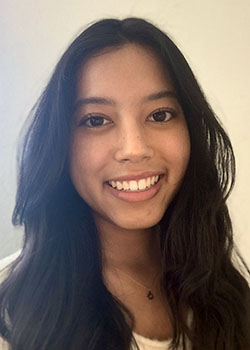
Hometown: San Marino, CA
Major: economics; minor: politics
What was your motivation to major in economics?
I have always been interested in social science and in high school I took a semester of economics, coincidentally taught by an Oxy alum who encouraged me to go to Oxy and pursue the social sciences because I did well in the economics class. Fast forward to Econ 102 with Professor Chiou: I was deciding whether or not to major and her advice was to challenge myself and continue what I was doing in her class—participating, going to office hours for help, and studying with my friends. Her encouraging advice to pursue the major was ultimately what motivated me to study economics because I knew I would have a great support system and academic community!
[Econ professors] truly care about our understanding of course material and take a genuine interest in students’ paths in the major and post-Oxy goals.
Can you describe your working relationships with econ professors? Were there any standout classes you’ve taken?
The economics faculty as a whole have been very supportive in and outside the classroom. They truly care about our understanding of course material and take a genuine interest in students’ paths in the major and post-Oxy goals. I really enjoyed “International Economics” taught by Professor Mora because the course combines my interests in local and global politics with business and economics. Professor Mora emphasized thinking about welfare and how trade policy such as tariffs affects all stakeholders involved including workers, consumers, and political ramifications. I am also excited to be taking Professor Mora’s senior seminar, “Firm Level International Trade and Investment” to expand my knowledge of the subject and take a field trip to the Port of LA!
What are your plans or ambitions post-Oxy?
I am planning to pursue a career in strategic communications consulting which is a niche within public relations. This field is rooted in the ability to write, speak, and think strategically, which is the backbone of our liberal arts education at Oxy. In strategic communications, one often has to pull from knowledge about the macroeconomy and consumer behavior as well as understanding the legal system and helping firms make decisions. Economics has taught me to think critically in the short- and long-term, and how to effectively communicate through discussion of theory, math, and intuition. At Oxy I have been able to take classes in economics, politics, religious studies, and more which I believe has given me a more nuanced view of the world.
Because we are a large department, there are so many opportunities to put yourself out there, meet new people, and learn about your own personal interests.
Do you have any advice for a student considering a major in economics?
My advice is to get involved in the department as early as possible, even if you are still undecided. This could be through going to Economics Student Association (ESA) or Women of Economics (WOE) events such as the faculty-student mixer, joining an e-board, or becoming a research assistant. Because we are a large department, there are so many opportunities to put yourself out there, meet new people, and learn about your own personal interests. I was able to do research with Professor Chiou as a sophomore which exposed me to economic concepts in industrial organization and academia. I also got involved in WOE which was a great way to meet older students and learn about their experience in the major plus their potential career paths.
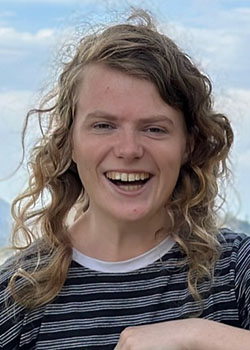
Hometown: Cable, WI
Majors: economics, politics
What was your motivation to major in economics?
When I enrolled at Oxy my freshman year, I fully intended on majoring solely in politics. I applied for an 8-unit first-year seminar program called ASSETS which combined ECON 101 with a CSP course (now called FYS) that examined the social applications of economics. I applied to better understand policy and politics, but I remember thinking, "There are actual solutions here!" halfway through my first semester. Where politics provided an avenue for much-needed discourse and participation, well-designed policy seemed to be largely based on economics. I declared my economics major the next semester.
Research has been one of the most rewarding academic experiences I've had at Oxy.
Have you taken part in any economics research opportunities at Oxy or elsewhere?
Research has been one of the most rewarding academic experiences I've had at Oxy. I worked as a research assistant last year under Professor Mora which involved a lot of data cleaning on Stata (a super awesome statistical analysis software), reading past economics research, and eventually writing a paper to submit for publication. I loved the experience of diving deep into an economics question and sorting out causes of and solutions to social problems, so I conducted an independent research project on the effects of rail expansion and disabled employment with funding from the Summer Research Program at Oxy this past summer. I am currently writing another research paper as a result of this work.
What are your plans or ambitions post-Oxy?
I hope to attend a pre-doctoral research program in economic policy before pursuing a Ph.D. in economics. My research experience has shown me that economics research is something I want to pursue as a career, either in an academic or a policy setting. I'd also like to build quantitative skills, so I hope to take more math classes during my next career phase.
If you're like me, theory courses will be difficult. There is a lot of math, and I didn't feel like I had the math skills to succeed. But math is learnable!
Do you have any advice for a student considering a major in economics?
If you're like me, theory courses will be difficult. There is a lot of math, and I didn't feel like I had the math skills to succeed. But math is learnable! Getting a theoretical economics background will allow you to see and analyze the world in new ways, setting you up for success in electives (which are so much fun!). Also, get involved in research early if it interests you in the slightest. I didn't get involved until my junior year, but I wish I had started much earlier. So, talk to professors, show interest, and pay attention to the world around you.

Hometown: Evanston, IL
Majors: economics, computer science
What it was like taking business classes through the Oxy-Caltech Exchange Program?
I thoroughly enjoyed the finance course (BEM 103) I was able to take through the Oxy-Caltech Exchange Program. I love Oxy’s focus on liberal arts and think this exchange program offers additional subject areas not taught at Oxy which enhances the Oxy experience. The course is lecture-based and relatively similar to most Oxy economics course formats, but there were close to 100 students in the class.
Do you have any advice for students who are interested in taking business and finance courses through the Oxy-Caltech Exchange Program?
My advice to students who are considering taking business, economics, and management courses through the Oxy-Caltech Exchange program is to reach out to your Oxy advisor along with the Caltech professor teaching the course you are interested in. The Caltech professor will be able to walk you through course prerequisites and required prior knowledge. One thing to keep in mind is that all Caltech students are expected to have completed math courses through Multivariable Calculus and Linear Algebra. There is also a strong focus on programming skills in the Investments course (BEM 104).

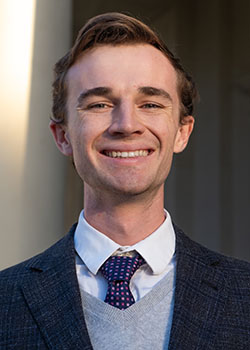
Hometown: Alameda, CA
Major: economics; minor: mathematics
What was your motivation to major in economics?
I came to Oxy knowing that I wanted to major in economics after reading Freakonomics by Stephen Dubner and Steven Levitt. I still remember lying awake in bed during winter break my senior year of highschool after thinking I’d just pick up the book as some easy evening reading—only to have my mind racing trying to find new and interesting ways to answer the questions they were presenting. This book took my understanding of economics beyond “It’s about money” and instead presented my logic-oriented brain with an analytical framework for exploring social patterns and behaviours that has only become more interesting through college.
Can you describe your working relationships with econ professors? Were there any standout classes you’ve taken?
Strong student-professor relationships are intrinsic to Oxy’s learning model and this is certainly true in the economics department. Countless times I have reached out to a professor I wasn’t even taking a class with to ask a general question from a podcast I listened to or something I read and been told to come to office hours, where I was locked in a half-hour conversation. Most notably, professors’ doors were open to me the second I stepped on campus. In my first semester at Oxy I took Econ 101 with Professor Wandschneider and after almost every lecture I would follow her back to her office, peppering her with questions. This relationship helped to foment my interest in macroeconomics and made me feel comfortable academically from week one.
Just like you chose to attend a liberal arts college, your professors chose to teach at one. Each and every one of them truly loves engaging with students and wants to share their academic passion with you.
Have you taken part in any economics research opportunities at Oxy or elsewhere?
At Oxy I have had the opportunity to do two full summers of research under the direction of Professor Jalil through our Undergraduate Research Center's Summer Research Program. Both of my projects have utilized the historical narrative approach, meaning I read newspaper articles on a period and region of interest and assigned the articles scores according to preestablished definitions to document trends in public monetary opinions. For example, In my more recent project we started creating a sample of episodes from 1945-1970 that contributed to Germany’s conservative monetary character. We did so by scoring articles on dimensions of monetary goals, inflationary sentiment and view on central bank independence. Research has been an incredibly rewarding process for me and has extended my academic environment beyond theory and into practice.
What are your plans or ambitions post-Oxy?
After Oxy, I plan on pursuing a Ph.D. in economics and am currently applying for research jobs at the Federal Reserve and other predoctoral programs. In my time at Oxy, not only have I gotten the chance to work on multiple projects, but with each I have been given a large degree of independence. My research this summer relied heavily on a couple of central definitions, and early in the project we realized one of the definitions was missing an important pattern we were seeing in the narrative. In our weekly meeting, where we usually go over my appendix entries to ensure consistency, we instead revisited the definition and rewrote it together incorporating many of my ideas. My relationships with professors give them a basis to trust me both in and out the classroom, which provides me with affirmation and the confidence to pursue academia as a profession.
Research has been an incredibly rewarding process for me and has extended my academic environment beyond theory and into practice.
Do you have any advice for a student considering a major in economics?
Reach out to professors! Should you come to Oxy, just like you chose to attend a liberal arts college, your professors chose to teach at one. Each and every one of them truly loves engaging with students and wants to share their academic passion with you. Try to put your foot in the door by week one or two of classes and if you feel like you don’t know what to say just show up at office hours and either ask about their research or start listing your interests and seeing how the conversation builds based on the intersection with theirs. Also don’t be afraid of looking at classes in other departments. Economics is a framework for examining social questions, and you can learn a lot from asking a psychologist or a sociologist the same questions. Taking an interdisciplinary course load enhances your ability to think deeply about an issue so don't stray away from the wide variety of courses Oxy has to offer.
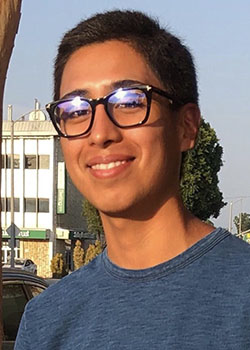
Hometown: Phoenicia, New York
Major: economics; minor: Urban & Environmental Policy
Can you describe your working relationships with econ professors? Were there any standout classes you’ve taken?
My experience as an economics student has been very positively influenced by the interactions I’ve had with my professors. The economics professors here at Oxy are highly skilled, extremely supportive and very passionate about their individual research areas. This makes their classes intellectually stimulating yet approachable. Oxy professors want their students to succeed, and they are more than willing to offer guidance regarding coursework, research opportunities, internships and career paths. While the economics department is quite rigorous, the professors are invested in not leaving any student behind. They are receptive to feedback, and constantly strive to make the economics major as inviting and exciting as possible.
Three standout classes I’ve taken are “Applied Econometrics” with Professor Williams, “Environmental Economics and Policy” with Professor Umanskaya, and “Economics of Sustainable Development” with Professor Wong. The first class taught me how to use various econometric approaches to analyze data and create statistical models. These skills later benefited me in my various internships and research experiences. The latter two classes illustrated the role that economics plays in creating and improving environmental policy, as well as guiding sustainable and efficient international development. By applying various economic theories, evaluating market-based environmental policies and modeling different forms of international cooperation, these classes contextualized the climate crisis and contemplated how we can better address environmental health, resource extraction, emissions reduction, poverty and growth.
Have you taken part in any economics research opportunities at Oxy?
I served as a research assistant to Professor Seva Rodnyansky in the UEP department on a project studying the evolution of California’s Central Valley demographics, “super-commuters” and regional fiscal stress. As an undergraduate researcher, I imported high-level panel/cross-sectional ACS + Census data into Stata and Excel to be merged, appended and reshaped in order to acquire descriptive, statistical, graphical analytics. This process gave me valuable experience working with large data sets often utilized when evaluating policies, analyzing/summarizing trends and executing calculations. Additionally, I conducted research and survey outreach, producing quantitative/qualitative reports and summary presentations relevant to our project and its key stakeholders. The technical and analytical skills that I developed in this position have prepared me to clean data, create coherent models and reports, and use my findings to inform critical decision-making. These skills will undoubtedly help me in my future career and economics coursework at Oxy.
While the economics department is quite rigorous, the professors are invested in not leaving any student behind. They strive to make the economics major as inviting and exciting as possible.
What do you like most about studying economics?
I like experiencing the “Aha!” moments that come with learning about how economic theory, models and analysis can be applied to understand and inform contemporary policy issues, business outcomes, and individual choices and behavior. Economics allows us to better understand the institutions, policy debates and day-to-day activities that shape our lives. Reading quantitative and qualitative research when evaluating how economic thought has evolved throughout time is fascinating to me. I’m also intrigued by the myriad connections economics has to the other areas of study I’ve explored at Oxy. And, of course, the welcoming and stimulating environment offered by the economics department shouldn't be overlooked!
What are your plans or ambitions post-Oxy? How has the liberal arts approach helped to shape those future ambitions?
I plan to pursue a career as an analyst with an economic consulting firm. I am very interested in using quantitative/qualitative research, statistical/econometric modeling and economic theory to anticipate/evaluate potential class-action disputes, damages, risk exposure and economic policy impacts. Oxy’s liberal arts approach has taught me to appreciate a variety of disciplines and perspectives through exposure to various areas of study. This enables me to think critically and efficiently when addressing the various issues that economic consultants face. With a strong emphasis on written and oral communication skills, as well as collaboration, my Oxy experience motivates me to work toward making the world a better place, both as an individual and a professional. Down the road, I am interested in drawing on my UEP minor and urban housing interests to potentially enter the sustainable/affordable real estate development industry. Oxy has transformed me into a much more equity-oriented person, and I am excited to see where this takes me!
My Oxy experience motivates me to work toward making the world a better place, both as an individual and a professional.
Do you have any advice for a student considering a major in economics?
If you are considering the economics major, or find it hard to commit after taking the introductory-level courses, push yourself to take a higher-level elective! This is where economics, for me, became very attractive as a potential major and career path. The electives apply the core models and theory you learn in the introductory classes to real world situations and problems. Whether it be “Environmental Economics” with Professor Umanskaya, “Economics of Sustainable Development” with Professor Wong, or “International Economics” with Professor Mora, I can almost guarantee that you will find a niche topic to solidify your interest. Sometimes, the optimizations, derivations and multi-step calculations emphasized early on can be overwhelming. Remember, not every econ major goes into finance or accounting! There are countless ways that your economics background can be applied to impact the policy and business outcomes that interest you! Diversify your classes and reach out to your professors/tutors/peer groups (like the Economics Student Association) when you need clarification or solidarity. A good economist is an incessant questioner, so never be afraid to ask for help. Most importantly, make a few close friends in the major who share your drive and interests—it makes all the difference!
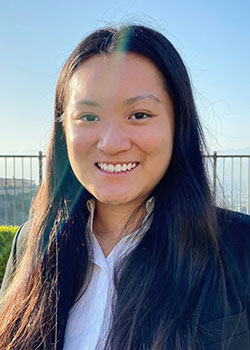
Hometown: Chino Hills, CA
Major: economics
What was your motivation to major in economics?
I did not know what I wanted for a career or a major when I started college. I just knew that I eventually wanted to be able to make an impact on social issues, especially those related to race, gender, mental health, education and income inequality. I heard that the economics department at Oxy has a strong reputation so I enrolled in Econ 101 my first semester to explore my options. I soon got the sense that economics is a channel into everything I cared about as I saw some of its applications to the world and wrote a paper in my 101 class about the long term benefits of attending preschool. My interest in economics further evolved in Econ 102. The class focused on developing our analytical skills and dived deeper into how economists use models to explain the world. I found that the analytical and model-based approach used in econ provided me with a concrete way of thinking about social issues. I also had a lot of interest in Professor Lopez’s research. I relayed all of this to her and she strongly encouraged me to declare the major and apply for the Women of Economics e-board. I later met Professor Lehr at an economics department student-faculty mixer. He told me that we need more women studying economics at all levels to give our input on issues that we can personally relate to, such as gender inequality, abortion and taxes on feminine hygiene products. This helped me realize that economics is what I wanted to devote my career to.
Can you describe your working relationships with econ professors? Were there any standout classes you’ve taken?
One of the highlights of my experience at Oxy has been the relationships that I have formed with my econ professors. Professor Lopez especially has been such an excellent mentor. She was the first person to spot my potential and has helped me see it, too, with her endless encouragement and guidance. My other professors have also always been willing to help me with anything I needed, whether it was career/professional advice, help with a problem set, or even just showing their support at Women of Economics events. An experience that stands out in particular is how much support I had from my econ professors when I was applying for internships and jobs. They did mock interviews with me, read one draft after another of my application materials, and connected me with their former students who went through the same application process. Their support has been invaluable.
One of the two standout classes that I have taken is “Game Theory” with Professor Lehr. The class changed the way that I think about the world and significantly improved my problem-solving skills. The class also had a very strong sense of community. Our entire class was once in Professor Lehr’s office hours at the same time because we were all stumped by the problem set. He was extremely helpful, and my classmates and I worked together to figure it out. “Advanced Econometrics” with Professor Williams has been my other favorite econ class. The sense of community with my classmates and with Professor Williams was also very strong, as we tackled grad-level content together.
Have you taken part in any economics research opportunities at Oxy or elsewhere?
I am grateful to have been able to participate in multiple economics research opportunities both at Oxy and at my internship. This past summer I was an intern at the National Economic Research Associates. My research experiences at Oxy, all of which involved working with data, greatly prepared me for my internship. My first exposure to economics research was through the Undergraduate Research Center the summer after my sophomore year. I had a summer fellowship mentored by Professor Ngo. Our first project measured economic growth in Mexico, and our second project was about the effects of outdoor learning spaces. My junior year I became a research assistant for Professor Lopez. I worked on a project related to county jails, and we are currently doing research on diversity in economics. During my junior year I also worked on an independent research project mentored by Professor Harris. I examined the wage gap between heterosexual and non-heterosexual individuals and looked for evidence of discrimination.
Economics has applications to virtually everything. Seeing its applications to topics that you are most passionate about will help bring more purpose to your studies when you feel caught up in theory and math.
What are your plans or ambitions post-Oxy? How has the liberal arts approach helped to shape those future ambitions?
I plan to either continue to work in economic consulting or pursue a predoctoral program at the Federal Reserve or an academic institution. Later, I hope to pursue graduate studies in economics. My education in the liberal arts has prepared me to look at the world with an eye for spotting social fluxes that run deep but also for believing that change is possible, and we need people from every academic discipline for it to happen. This has motivated me to become an economist in order to be a part of that change. The classes that I have taken outside of the Economics Department have exposed me to what issues need to be addressed and how to effectively think about them. Economics then allows me to model these issues mathematically, ask research questions about them, and use reliable research methods to seek answers. My project on the impact of sexuality on wages was inspired by a Diplomacy & World Affairs class I took. The class had very few economics concepts, but it helped me understand the need for my research and identify where to start. The topics that I hope to research in the future also draw on a lot of inspiration from my sociology and religious studies classes.
Do you have any advice for a student considering a major in economics?
Don’t get intimidated by math. Math anxiety is common among economics students, but don’t forget that math can be learned, and you have an entire department of people who are more than willing to help you learn it. Similarly, don’t get intimidated by the challenging classes. They are designed to be challenging to develop your analytical skills in ways that are important in both the job market and in life. It is perfectly fine to feel like you are struggling with a concept or a problem set. There are plenty of resources. Go to professor office hours, peer tutoring, and study hours hosted by the Women of Economics and Economics Student Association. Also, form a small study group and set weekly meetings to talk through frustrations or work on problem sets together. Lastly, find out what area of economics interests you the most. Ask your professors to tell you about some of their research projects. If you are passionate about addressing gender gaps, read about what economists have done so far and talk about it with a professor who has done research in that area. Economics has applications to virtually everything. Seeing its applications to topics that you are most passionate about will help bring more purpose to your studies when you feel caught up in theory and math.
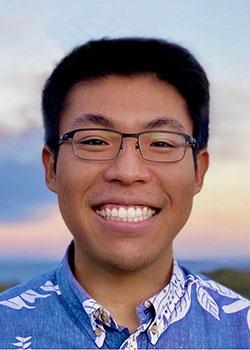
Hometown: Honolulu, HI
Major: economics; minor: Japanese Studies
What was your motivation to major in economics?
In my junior year of high school, I took Advanced Placement Economics. I found the class insightful in its approach to answering curiosity-based questions like “Why do airlines have so much pricing power?” or “Why do restaurants continuously open and close?” When I arrived at Oxy, I knew I wanted to continue my economic studies especially because I was still unsure of what I wanted to do career-wise. I was certain I wanted to be an economics major when I began to take higher-level required courses like “Intermediate Microeconomic Theory” with Professor Ngo. While the class was no walk in the park, it showed me how economics is really decision making in a vacuum and how interconnected it can be with public policy, private enterprise and consumers.
Can you describe your working relationships with econ professors? Were there any standout classes you’ve taken?
While all Oxy professors take a genuine interest in their students, I felt that the economics department was especially interconnected and dedicated to their students. My favorite course was by far “Managerial Economics” with Professor Studenmund. The course focused on Harvard Business School case studies and required us to practice not only public speaking and presentation skills, but our ability to form and defend logical arguments. Being the only sophomore in a class of predominantly juniors and seniors was a little intimidating, but with Professor Studenmund’s help, I was pushed beyond my comfort zone and improved my critical thinking skills. Professor Studenmund continues to be a mentor today and has helped me with internship and career placement. It’s not uncommon to see econ professors reaching out with exciting opportunities or having hour-long conversations during office hours about life, career or academic advice.
I’ve also enjoyed the small-scale learning environments at Oxy. Not only do they allow for critical conversation, but also for deep relationships with professors and peers.
What do you like most about studying economics?
I really enjoy how economics has the ability to dispel inaccuracies we often hear and are inclined to believe. For example, in my “Labor Economics” class with Professor Harris, we discussed the effects of minimum wage laws on rates of employment. I think too often, we jump to the conclusion that an increase in the minimum wage causes job loss. We learned, however, that certain industries have the ability to absorb these costs without damaging employment rates of relatively low wage earners. Using regression analysis, we’re able to quantify certain factors and variables to better understand their effect and magnitude on large scale outcomes. That, to me, is what makes studying econ fun.
What are your plans or ambitions post-Oxy? How has the liberal arts approach helped to shape those future ambitions?
After Oxy, I’ll be joining the world of corporate finance in Northern California. My liberal arts education has been invaluable to me in so many regards. The best part is the interconnectivity between other disciplines and economics. Taking classes in various fields beyond the required courses allowed me to expand my problem-solving skills and piqued my interest in how connected our world is. Where else can we see the effects of using economic intuition and incentives to correct natural resource depletion? I’ve also enjoyed the small-scale learning environments at Oxy. Not only do they allow for critical conversation, but also for deep flowing relationships with professors and peers. Both factors have helped shape me and I’m thankful to have met so many great people in my college career.
Do you have any advice for a student considering a major in economics?
My advice is threefold and generally applicable to any major: don’t get caught up in the grades, take courses based on your curiosity and never be afraid to ask for help. I think too often we get concerned with grades, but in reality, the learnings and stories we take away from the classes are so much more valuable. One’s focus should be on studying to learn and not studying to get a good grade. Strive to take the classes that intrigue you. The econ electives allow you to explore how versatile the field is and how we can quantify decision making with applications to policy, consumer behavior and even general curiosities. Lastly, reach for help when you need it. People at Oxy want to help, and they’re more accessible than you think.

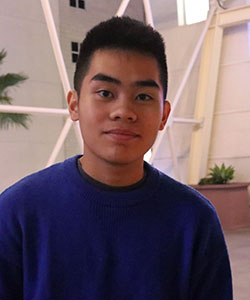
Major: economics
Minor: politics
What do you like most about studying economics?
I like how the concepts and models can explain a lot about the world we live in and the decisions people make. As an economics major, I have started applying economic thinking in many aspects of my daily life, such as thinking about opportunity costs when making certain decisions.
Have you taken part in any economics research opportunities at Oxy or elsewhere?
I am currently working as a research assistant with Professor Jason Wong, looking specifically at worker remittances and the economy of the Philippines. I also participated in Carnegie Mellon University’s Public Policy and International Affairs Junior Summer Institute where I researched the relationship between neighborhood segregation and the achievement gap.
Did you study abroad? How did it enhance your education?
I studied abroad in Germany during my junior year. A key component of my abroad experience was getting a firsthand look at the complexities of the policy making process by visiting multiple European Union institutions and meeting with policymakers at different levels. My program focused on the intersection of politics and economics, which allowed me to learn how political and economic factors shape policy making.
What are your plans post-Oxy and how has the liberal arts approach shaped your future ambitions?
I plan to pursue a master’s degree in public policy. The wide range of classes I have taken at Oxy has helped me gain valuable analytical, technical and interpersonal skills that will be useful for a career in policy.
Do you have any advice for a student considering a major in economics?
If you are still unsure about majoring in economics after taking ECON 102 or 250, try taking an elective course! While the core courses provide you with the framework economists use to analyze issues, the elective courses apply models to real world situations which are more practical.
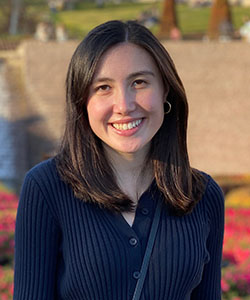
Major: economics
Minor: politics
What was your motivation to major in economics?
I came into Oxy undecided about what I wanted to major in. However, after taking some economics classes, I saw how applicable the study of economics is in providing insight and policy recommendations to solve real world problems. My Intermediate Microeconomics and Macroeconomics classes in particular affirmed my decision to major in economics; they discussed a wide variety of topics from consumer theory to monetary policy which I found very fascinating.
Can you describe your working relationships with econ professors? Were there any standout classes you’ve taken?
My experience as an economics student has been very positively shaped by the relationships I have formed with my professors. The economics professors are extremely supportive of their students and passionate about their specialized research areas. If I ever have a question about class material, my professors have been very accessible through office hours or scheduled appointments. During office hours, my professors have also been happy to speak with me about economic research opportunities and provide guidance about future career paths.
A standout class I have taken is Advanced Econometrics with Professor Kevin Williams. This class opened my eyes to various econometric approaches that researchers take to analyze data and draw causal inferences. I also gained a deeper technical understanding of econometric concepts which aided me in my summer research work. With the skills I have learned in this class, I am able to model everyday problems in an effective way which I believe is very powerful.
Have you taken part in any economics research opportunities at Oxy?
I was fortunate to be granted the opportunity to assist Professor Diana Ngo in researching the effects of experiential outdoor education for over a year as a research assistant and Undergraduate Research Center summer research fellow. My research experience has allowed me to build practical skills such as cleaning, merging and analyzing data. This experience has also given me the opportunity to build a relationship with a professor who shares similar research interests as myself and has challenged me to think more critically.
What are your plans or ambitions post-Oxy and how has the liberal arts approach shaped your future ambitions?
After Oxy, I plan to work for a few years as a research assistant at the Federal Reserve or as an analyst at an economic consulting firm. In the future, I plan to pursue a Ph.D. in economics. My liberal arts education has enabled me to approach global challenges with multiple lenses and think critically about proposed solutions to these problems. As a politics minor, I have been able to use my knowledge of economics to model societal issues discussed in my politics classes and propose efficient and practical policy solutions.
Do you have any advice for a student considering a major in economics?
Be inquisitive, collaborate with peers and don’t be afraid to ask for help! The Oxy economics major has a ton of resources to support students, including peer tutors, student clubs (Economics Student Association and Women of Economics) and professor office hours. Taking advantage of these resources will not only help you succeed but will also help you build relationships with faculty and peers.
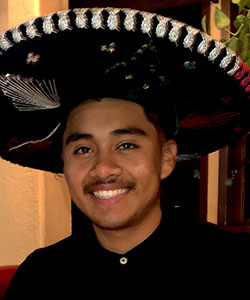
Major: economics
What was your motivation to major in economics? Was there an inspirational moment or experience you can point to?
My motivation to major in economics initially was the direct connection to mathematics to explain the models and solve for specific variables of interest. I was always interested in mathematics and its applications, so soon after my introductory economics course I saw immense potential for applying mathematics. One inspirational moment was during my Principles of Economics II class with Professor Daron Djerdjian in which my initial grades were not ideal. But he reached out to me because he saw potential in me and offered an opportunity to redeem myself and raise my grades. My current motivation for continuing the economics major is the ability to work with and learn from caring, professional, and challenging faculty who allow me to showcase my ability independent of a letter grade.
Can you describe your working relationships with econ professors? Were there any standout classes you’ve taken?
My working relationship with the economics department professors is superb, respectful and mutually understanding. I feel comfortable speaking with any professor on a range of topics both within and outside the scope of class material. Two standout classes that boosted my confidence in economics were Applied Econometrics with Professor Kevin Williams and Labor Economics with Professor Jorgen Harris. Both of these classes gave me the tools and knowledge base necessary to excel in any setting within economics and even research in general. That is not to say that all my other economics courses did not help me improve my skills, rather that the courses with Professors Williams and Harris represent the space in which I felt the most confident and realized the most gains in understanding.
Have you taken part in any economics research opportunities at Oxy or elsewhere?
Up to this point I have not engaged with Oxy’s formal opportunities of research, such as the Undergraduate Research Center or as a research assistant with a professor. However, another great aspect of the economics department is my peers, who are active in economic inquiry and not afraid to tackle a challenge. Currently I am working with friends and classmates on potential research for our own purposes, which entails a project that we are interested in and pursue because we want to apply what we have learned rather than as a mandatory assignment. The opportunities are out there and all it really takes is some initiative to ask professors or submit that application, and if you do not get the opportunity right away the faculty notice your efforts so that when another chance is available you’ll be the first one in mind.
What do you like most about studying economics?
It is the combination of critical thought, normative argumentation, and the people who make up the department (students and faculty alike). It is enriching to learn various methods and models and be able to apply them where applicable. It is also enriching to engage in academic debate and argue with economic concepts and reasoning. My peers and professors create such a welcoming and lively environment that does not discourage participation or questions, in fact those two aspects are encouraged, and all ideas are valued within the scope of each class. The most exciting aspect of economics is the application to policy, and as of late that is the component that motivates me the most because with that I can participate more effectively in the shaping of policy at a local and more broad level.
What are your plans post-Oxy and how has the liberal arts approach shaped your future ambitions?
I plan to pursue a career in consulting and perhaps graduate school later down the road. I feel very prepared and Oxy has given me many tools and foundations with which to successfully achieve my ambitions and I truly do believe that is because of the liberal arts approach. With its emphasis on multidisciplinary education, the liberal arts approach is key in consulting because attention to detail and an ability to synthesize various perspectives is crucial for crafting sound decisions. Written and oral communications skills, which are emphasized in all subjects and classrooms, allow me to express myself effectively to others who may or may not know what I know, which is also a key aspect that gives me confidence in the pursuit of my post-Oxy ambitions.
Do you have any advice for a student considering a major in economics?
My biggest advice to students considering the economics major is to not be afraid of the math! Many times my peers and I have fallen into deep troughs of confusion regarding technical details or symbols and sometimes it gets paralyzing or demoralizing. But do not fear, because the economics and math professors are more than willing to help you and will most likely explain a concept or problem to you, and maybe more than you might expect. Mathematics is a tool that boosts your economic understanding and confidence and should not be a barrier to entry. I do not expect to be an expert the first time around with new concepts and neither do your professors, so it is okay to initially be unsure and to ask for help. You are more than capable of learning just about anything that crosses your path.
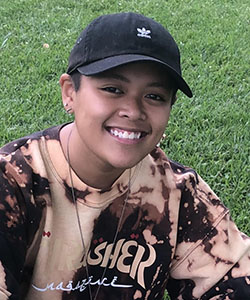
Major: economics
Minor: studio art
What was your motivation to major in economics?
When I came to Oxy, I didn’t entirely know what “economics” was. All I knew was that being introduced to a primarily white institution while coming from a low-income family living in a largely POC neighborhood was a big shock—and it definitely came with its own set of challenges, frustrations, and confusion. These feelings urged me to search for a field of study that would better help me understand the systems and structures in place that contribute to the disparities in resources, education, and health we continue to see today. Understanding these systems, structures, and cycles allows us to pinpoint where we as a society can improve and how we can best move forward.
Have you taken part in any economics research opportunities at Oxy?
I’ve been working as a research assistant with Professor Diano Ngo since my sophomore year and it has given me the opportunity to realize how economists use the theories, models, and technical skills taught in class in order to answer real world questions. We have been able to work on projects such as studying the determinants of the STEM gender gap in Mexico City, using durable goods as a means of measuring poverty in developing countries, and examining the various benefits of outdoor experiential learning.
What do you like most about studying economics?
I like being able to take big ideas/challenges and re-conceptualize them in a more concrete, mathematical or graphical manner. Economics allows me to further explain or illustrate the knowledge I’ve previously accumulated through personally interacting with my surroundings. It provides another layer of understanding about how the world around me works.
What are your plans or ambitions post-Oxy and how has the liberal arts approach helped to shape those future ambitions?
I plan on continuing my involvement in economics research. The technical tools I’ve learned to make use of as an economics major—in combination with the histories, ideologies, and theories I’ve been exposed to as a liberal arts student—have motivated me to look at the world through a critical lens. I intend to use these skills to pose questions about the structures that contribute to inequality, poverty, climate change etc., and search for policies and solutions to best support the communities most affected by these problems.
Do you have any advice for a student considering a major in economics?
Be open-minded and don’t get too caught up in the numbers! At some point during my time at Oxy, amidst all the calculating optimal values, I found myself getting lost in the numbers and forgetting my initial motivations for studying economics. Taking classes outside of my economics major that complemented my studies and interests encouraged me to maintain a well-rounded mode of thinking. I think it’s important to keep in mind that the numbers we work with in economics may represent real lives, people, and choices. Remember that our classes are meant to supply us with tools and foundations. What we choose to do with them is up to us—the sky's the limit!


What was your motivation to major in economics?
My motivation for studying economics originally was and continues to be the search for empirical truths. In my eyes, the purpose of education is to better understand the world around us. I believe that the data-driven and self-skeptic nature of economics brings us closer to a true understanding of the world. Against the backdrop of disciplines that deal in generalities and qualitative evidence, economics is a refreshing way to understand the world.
Can you talk about a standout course you’ve taken?
“Behavioral Economics” was a standout class that I took with Professor Brandon Lehr. It opened my eyes to the many heuristic and cognitive biases that humans exhibit, and it offered a compelling explanation for a number of phenomena that I had observed in the world but did not have an explanation for. It is also the single class at Oxy that made me most consider and re-evaluate the way that I approach life. Once you are exposed to the ways that humans are systematically biased, you begin to question how you may be irrationally approaching issues yourself.
Have you taken part in any economics research opportunities at Oxy or elsewhere?
I have had the pleasure of researching asset price bubbles with Professor Andrew Jalil for more than a year. My research experience offered me a hands-on look at the way in which economic research is conducted, and gave me hard skills in data collection, data cleaning and econometric analysis. However, the best part of the experience was building a relationship with and learning from an economist who shared the same passion for our research topic and the field of economics in general.
People view economics as only pertaining to the study of money, but it also covers topics ranging from urban planning to behavioral psychology.”
What do you like most about studying economics?
The aspects of studying economics that I enjoy most are the empirically based nature of findings and the wide range of topics that economics covers. People view economics as only pertaining to the study of money, but it also covers topics ranging from urban planning to behavioral psychology. Some of the most interesting papers in economics are looking at the effects of street lamps on crime or the effect of climate change on human migration. The ability to study almost any topic through the framework of economic thinking is very compelling to me.
What are your plans or ambitions post-Oxy?
After Oxy, I plan to pursue a Ph.D. in economics.
Do you have any advice for a student considering a major in economics?
I would advise students interested in economics to look at economics research in the sub-field that they are most interested in. If you are passionate about environmental issues, look at work from an environmental economist. If you like transportation, read the work of a transportation economist. Economics classes will teach you the basic framework and toolkit of economic thinking, but they can only get so specific in the topics they cover. When you see the way that the economics framework applies to what you are passionate about, you will be mesmerized.
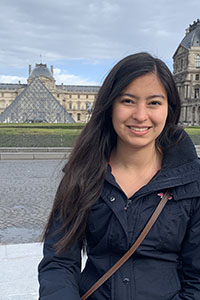
What was your motivation to major in economics?
When I was in high school and decided to attend Oxy, I did not know what I would major in because I had multiple interests. It was not until the summer before my first year that I had some exposure to economics through my participation in the Multicultural Summer Institute. It was there that I learned more about the social aspect of the discipline and not just the math portion, which I had previously associated economics with.
Can you describe your working relationships with econ professors? Were there any standout classes you’ve taken?
The economics professors at Oxy are very approachable, knowledgeable and passionate about their areas of focus. If there is class material that you do not understand, they are more than happy to help you during office hours and will make appointments with students who cannot make it to the scheduled times. They serve as mentors who share their experiences and expertise to expose students to various career pathways within economics that students may not have considered before. I enjoyed the classes “International Economics” and “Economic Development” because through these elective courses I had a chance to explore issues that are of particular interest to me.
[The economics professors] serve as mentors who share their experiences and expertise to expose students to various career pathways within economics that students may not have considered before.”
What do you like most about studying economics?
What I like most about studying economics is the ability to learn about relevant issues and developments that are in the news, such as income and wealth inequality in the United States and the humanitarian and financial crisis in countries such as Venezuela. With the tools I have learned in econometrics, I am able to quantify and measure the impact of these situations on individuals’ lives and reflect on the policy implications that can help me propose solutions to complex questions.
What are your plans or ambitions post-Oxy?
I plan to work in the financial services industry as an investments analyst. I am curious about learning how to build and manage portfolios of clients that set up foundations and endowments to support the most pressing needs of communities. In the future, I see myself going to graduate school to earn a master’s degree.
Do you have any advice for a student considering a major in economics?
One piece of advice that I would like to share is: don’t get discouraged by difficult classes that are required for the major! It is important to not only recognize when you need help but also to reach out to professors, peer advisors and fellow classmates. The more you take advantage of these resources, the more you will learn and get out of the courses. Then you will have more time to take electives that are especially interesting to you.
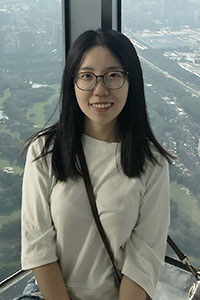
What was your motivation to major in economics?
When I was in high school, I did not take any econ classes but I learned AP Economics through reading textbooks and found it really interesting. Since I had never systematically studied the subject, I decided to take “Econ 101” during my first semester at Oxy. At that time I wasn’t so sure I would major in econ. But I felt more interested and became more certain about majoring in it as I learned about a wide range of topics, such as consumer-producer problems, government policies and climate change, all in one intro course. The course motivated me to major in economics, since I wanted to have a more thorough understanding of these topics.
Can you describe your working relationships with econ professors? Were there any standout classes you’ve taken?
The professors in the economics department at Oxy are passionate, kind and really care about their students. I enjoyed all the courses that I have taken since the professors always explain concepts clearly and patiently. As an international student, I really liked the course “International Economics”, in which I learned more about issues such as trade wars and exchange rates that have direct impact on my life. I also enjoyed “Economics of Race and Gender,” in which I got to know more about racial and gender inequality in the U.S. labor markets, and some potential solutions that can help mitigate the problems.
Have you taken part in any economics research opportunities at Oxy or elsewhere?
Currently, I am working as a research assistant with Professor Kevin Williams, creating a database for a brand new “Advanced Econometrics” course that will be offered next year. It is amazing to read research on various topics that utilize the techniques we’ve learned in Econometrics.
[Economic] models and predictions can help us come up with possible solutions that may solve many real world problems.”
What do you like most about studying economics?
What I like the most about studying economics is that we learn a wide range of topics from different fields, and many concepts are very applicable in everyday life. Although sometimes the assumptions and models economists create do not fully reflect real situations, simplified ideas do help us better understand how things work. Additionally, models and predictions can help us come up with possible solutions that may solve many real world problems. And Econometrics helps us understand how to test assumptions, improve models and reach more reliable conclusions.
What are your plans or ambitions post-Oxy?
My experience studying the liberal arts has helped me build a strong foundation for future study since I’ve learned many theories and models, and how to test their validity. I plan to go to graduate school after Oxy to learn more analytical skills.
Do you have any advice for a student considering a major in economics?
The professors are really nice so always go to office hours! If you have questions regarding homework or exams, the professors are always willing to help you. If you want to know more about their research or you plan to conduct your own research, they are good resources who can give you better ideas in the topics that you are interested in.
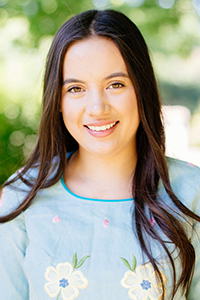
What was your motivation to major in economics?
I took my first college economics course during the Multicultural Summer Institute (MSI) and became interested when I saw how economic models could be applied to immigration and labor. I saw that economics has the tools to create models and use data to ask interesting questions about the real world, which was very appealing. After that, I told Professor Mary Lopez that I planned on majoring in economics and she handed me a four-year outline with what classes I should take. Both the material and the support made me decide to major in economics.
Can you describe your working relationships with econ professors? Were there any standout classes you’ve taken?
The professors in the economics department have been a big reason that I have had such a positive experience at Oxy. Since it is such a small school, professors are accessible and take time to get to know their students. I've been able to go into professors' office hours to get help on homework, advice about possible research topics, or talk to a professor about their research. They've also been really supportive in helping me to pursue my goals, whether it's telling me about opportunities or talking through future plans.
Have you taken part in any economics research opportunities at Oxy or elsewhere?
I have worked as a research assistant for two different professors, which allowed me to see how each goes about thinking about and answering their questions. I also participated in the American Economic Association Summer Program, where I researched the relationship between college enrollment and gentrification.
I like that economics asks interesting questions and then uses data to try and answer them.”
What do you like most about studying economics?
I like that economics asks interesting questions and then uses data to try and answer them. Economics encompasses aspects of many different fields, such as psychology, math, computer science and sociology. That makes it a very versatile field to study with lots of applications and a wide range of research questions.
What are your plans or ambitions post-Oxy? How has the liberal arts approach helped to shape those future ambitions?
I plan on spending two years working as a research assistant at the Federal Reserve or attending a predoctoral program. After that, I intend to pursue a Ph.D. in economics. Going to a liberal arts college allowed me to explore other disciplines and connect what I was learning in other classes to economics. That showed me how history, politics and psychology are all related to economics, and gave me a broader sense of what economics is.
Do you have any advice for a student considering a major in economics?
You don't have to be interested in finance or monetary policy to study economics. Studying economics gives you valuable tools to do many other things.


What was your motivation to major in economics?
One of the reasons why I chose economics is because I was interested in exploring the interplay between incentives and prices, as well as investments and trade. Given my own multicultural background, with lineages in Germany and Sierra Leone, I wanted learn more about key economic phenomena that can determine a country’s stability and prosperity.
Can you describe your working relationships with econ professors?
The econ professors at Oxy are honestly at the heart of what makes this major so worthwhile. They are so kind, approachable and eager to share their expertise. A class that has definitely stood out to me the most is my current 300-level econ course “Firm-level International Trade and Investment." For our final project, each student is given the opportunity to select an industry. I chose the cocoa industry because it covers key development issues of interest to me such as trade between West Africa, Europe and the U.S.; the impact of agribusiness on child labor in developing countries; and the role of the United Nations in sustainable development.
Have you taken part in any economics research opportunities at Oxy or elsewhere?
Yes, this semester I was given the opportunity to conduct research and create a literature review for Professor Ashenmiller regarding the effects that outdoor experiential learning can have on a child’s social and cognitive development.
What do you like most about studying economics?
I really enjoy the wide range of subject matter within the economics major. For example, I am currently enrolled in “Economics of Gender," “Firm-level International Trade and Investment" and “Economic Development." Each course enables me to look at various issues through the lens of economics.
What are your ambitions post-Oxy?
Post-Oxy, I aim to launch my career in the tech industry for an international company that values my diverse cultural heritage and my language skills in English and German.
Do you have any advice for a student considering majoring in economics?
Yes! I would highly recommend taking advantage of all the resources the economics department has to offer. With an economics major you can study abroad, participate in the UN Program and use the Bennett W. Schwartz Grant (granted by the economics department) to fund internships, independent studies, conferences and more!
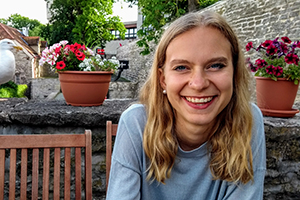
What was your motivation to major in economics?
I had been exposed to introductory economic theory in my AP Microeconomics and Macroeconomics courses in high school. I didn’t have a good grasp on what a career in economics looked like and, therefore, I admit that I didn’t initially intend on declaring the major. During my first semester at Oxy, however, I fell in love with this way of thinking about the world when I participated in the California Environment Semester, a first-year cultural studies program in which I conducted biology, geology and economics-related fieldwork with my professors and peers in Yosemite, Death Valley and Point Lobos. Throughout my time at Oxy, I’ve witnessed each of my economics professors continuously use their expertise to bring about meaningful change for the L.A. community, country and world. I hope to do the same someday!
Can you describe your working relationships with econ professors?
I can honestly say that the greatest part of my Oxy experience has been getting to know my professors and having had the opportunity to learn about their passions. It is the countless hours that I have spent in each of their offices that have truly distinguished my time at Oxy from an experience I would have had at a larger university. In terms of classes, I really enjoyed Economic Development and International Economics, but there also wasn’t a single economics course that I regretted taking. I only wish that I could have taken a few more electives before graduating!
Have you taken part in any economics research opportunities at Oxy or elsewhere?
This semester I’ve had the unique opportunity to conduct my own independent research project as part of the Senior Research Seminar. While it has undoubtedly been one of the most challenging projects that I’ve undertaken in my undergraduate career, I firmly believe that the empirical research, statistical software and economics writing skills that I’ve developed while investigating the “trade-migration nexus" will be invaluable assets in the future. I’ve also learned about each of my peers’ interests in discussing their research projects.
What do you like most about studying economics?
I most enjoy the everyday connections and applications of what I’m learning. When I read news headlines about Brexit negotiations or newly imposed tariffs, I always look forward to discussing the economic implications underpinning these current events in my classes. Throughout the years, I’ve taken such a wide range of economics electives that have been offered by the department, each touching on different dimensions of the field. I think that this exposure has substantially contributed to my overall ability to engage in more nuanced conversations about the world, which is crucial in any career that one may choose to pursue.
What are your ambitions post-Oxy?
I think that the beauty of an economics degree, and an Oxy degree in general, is that here we develop skills and ways of thinking about the world that are applicable across so many different fields. In July, I will begin working for a medical software company. While this isn’t what I envisioned “a career in economics" looking like, I will definitely draw upon both the quantitative and qualitative skills that my professors have taught me on a daily basis. In the more distant future, I could see myself pursuing a graduate degree, further delving into some of my intellectual curiosities: economic development, international trade and macroeconomics.
Do you have any advice for a student considering majoring in economics?
I think the best advice that I ever received was: don’t be afraid to struggle and step outside of your comfort zone, but also ask for help when you need it. Some of the most difficult classes that I’ve taken at Oxy (and in this department) have also been the courses that I now look back on and really appreciate. I would also strongly recommend making use of all of the wonderful resources that students have here at Oxy: apply to the Blyth Fund or the Occidental Consulting Group, ask your professors about research opportunities, take the Senior Research Seminar, go to office hours and study with your peers as much as you can. Not only does the economics department stand out with respect to phenomenal professors, but I’ve also learned so much from my fellow econ majors throughout the years. Good luck!
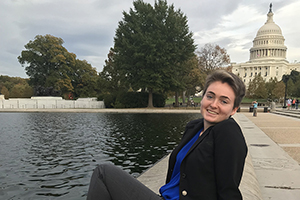
What was your motivation to major in economics?
I became interested in economics when I took a 101 class for my DWA (Diplomacy and World Affairs) major. I loved how concrete econ was, and how it gives us tools to answer policy questions that political theory cannot always solve on its own. I find that the two majors complement one another well, and having a quantitative background to supplement and support how I interact with policy-making has been really helpful in allowing me to approach problems and research questions in both majors. I love how practical econ is at approaching theory, especially in comparison to many other social sciences.
Can you describe your working relationships with econ professors?
I've had really wonderful experiences with a lot of the econ faculty. Professor Jalil inspired me to pursue econ in the first place during Econ 101, and he's been really helpful in advising me throughout the major. I also worked for Professor Chiou as a research assistant and grader, and she has been great at pushing me in a more professional sense as well as academically. After three semesters of classes with Professor Mora, I also feel very supported by him not just in econ but also through office-hour discussions about international policy. Most recently, in my honors research seminar, both Professor Lehr and Professor Wandschneider did so much to help me with my project outside of class/office hours. The project itself has taught me so much about approaching econometric problems and doing econ work independently.
Have you taken part in any economics research opportunities at Oxy or elsewhere?
I worked as a research assistant for Professor Chiou, helping collect data on internet search traffic. I've also been pursuing my own project this semester for the honors research seminar. I'm looking at the relationship between economic growth and democracy, arguing that it is inequality, rather than pure economic growth, that drives countries towards better governance. I find that econ has been helpful in other research endeavors as well. I spent last summer in Colombia doing research on the peace process with the FARC for my DWA thesis, and I found that the major source of conflict within the recent peace accord is whether neoliberal or redistributive economic policies should be implemented, especially in rural areas; essentially, how can economics solve the root causes of conflict. I was better able to understand these dynamics because of classes such as “International Economics" and “Economic Development."
What are your ambitions post-Oxy?
Next year I will be pursuing a master’s in international relations at the London School of Economics. After that, I hope to work in international policy and foreign affairs, ideally with an emphasis on conflict- and post-conflict reconstruction.
Do you have any advice for a student considering majoring in economics?
Take advantage of how small Oxy is and get to know the faculty! They will support you if you reach out and make an effort to create a relationship. Also, get through the basic econ requirements as quickly as possible so you're more qualified to do research and take higher-level electives as soon as possible, since those are some of the most rewarding parts of the major!
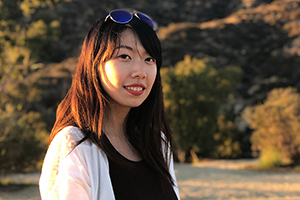
What was your motivation to major in economics?
I started studying economics with some vague idea that it is about recession, currency and prices. But surprisingly, as I took more classes, economics turned out to be more than that. It analyzes all sorts of human and organizational behavior, from micro to macro level.
Can you describe your working relationships with econ professors?
A privilege that econ students have is that our professors take teaching extremely seriously. I’ve worked closely with a few professors in the department, and according to my own experience and observations, they really put a lot of thought in refining their ways of delivering the knowledge. They work hard on their side to make things easier and smoother on our side, without lowering the standard they hope for us to achieve. This emphasis on teaching makes the department stand out from others.
Have you taken part in any economics research opportunities at Oxy or elsewhere?
I did two economics research projects through the Undergraduate Research Center in my sophomore and junior year with Professor Ngo and Professor Lehr, and an honors thesis my senior year. I examined efficiency level of Ghanaian health facilities, studied smoking behavior, and examined relationship between crime and guns. My growth along the way was tremendous. Both Professor Ngo and Professor Lehr provided excellent insights and guidance, and made huge impact on my life. Those experience added a lot value for me as a researcher and job-seeker.
What do you like most about studying economics?
For me, what’s cool about economics is that it really isn’t just a study about money or efficiency. Economics uses econometrics to study all sorts of human behavior and interaction, topics ranging from sociology, psychology, politics, finance, etc. As a curious person in nature, nothing is better than offering me a tool and telling me ‘go and use this to find out what you want to know about the world.’
What are your ambitions post-Oxy?
I will be working as a research analyst in the New York City office of NERA Economic Consulting after graduation. I am planning to pursue a Ph.D. in economics after that.

